
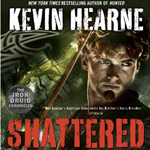 Shattered (The Iron Druid Chronicles, #7)
Shattered (The Iron Druid Chronicles, #7)
By Kevin Hearne; Read by Luke Daniels
Publisher: Random House Audio
Publication Date: 17 June 2014
[UNABRIDGED] – 11 hours, 35 minutes
Listen to an excerpt: | MP3 |
Themes: / druids / urban fantasy / plague /
Publisher summary:
For nearly 2,000 years, only one Druid has walked the Earth – Atticus O’Sullivan, the Iron Druid, whose sharp wit and sharp sword have kept him alive as he’s been pursued by a pantheon of hostile deities. Now he’s got company. Atticus’ apprentice, Granuaile, is at last a full Druid herself. What’s more, Atticus has defrosted an archdruid long ago frozen in time, a father figure (of sorts) who now goes by the modern equivalent of his old Irish name: Owen Kennedy. And Owen has some catching up to do.
I’ll start by saying that this is my first foray into the Iron Druid series so this review is from the perspective of someone who hasn’t done the previous books. I would not suggest this book as a great place to start this series. I heard this was a great entry point into the series for fans of urban fantasy but so much of what’s going on in the plot is lost that I missed the overarching significance of what happened in the story. Now that that’s out of the way…
Shattered is an urban fantasy story about one of the last druids in the world trying to live his life while trying to survive the crazy plots of mythical creatures and gods. Hearne’s writing style flows easily and his characters are enjoyable, but I thought the story lacked focus and almost felt like two disjoint stories that didn’t really relate to one another until both ended into a third thread. I liked the use of the urban setting and the creative use of different abilities/powers that characters. There are many quotes and references to geek culture in there but so much that it kept pulling me out of the story.
The first 2/3 of the story has two different threads that are both interesting in their own right but have nothing to do with each other. One thread is about a female druid trying to stop a plague happening in India while the other follows the eponymous iron druid as he introduces someone trapped in time centuries ago to modern culture. Neither story required prior knowledge of the series but the last 1/3 of the story seemed to be a culmination of events from previous stories that was mostly lost on me. I actually thought I was almost done with the audiobook 2/3 of the way through and it felt like a bit of a false ending.
The world and characters in this story are the best part. I liked most characters, thought they were well written, and stayed true to character. I really liked the old druid getting to know modern culture and hearing his take on how he sees things. The comedy relief and quotes/references to geek culture was a bit much at times and took me out of the story too much.
As for the audio side of things, Luke Daniels does a fantastic job reading this book. On one side of things I can hardly believe he does all the voices I heard in the book, on the other side the two main characters sound an awful lot like each other and I would get confused at the beginning of a chapter sometimes until I identified who was speaking. Both voices were great and it didn’t take away from the story, I just thought it was interesting considering how different many of the other voices are. I will definitely be looking for other audiobooks narrated by Luke Daniels.
Posted by Tom Schreck
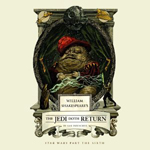 William Shakespeare’s The Jedi Doth Return
William Shakespeare’s The Jedi Doth Return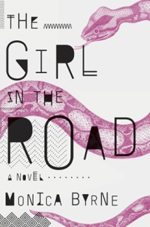 The Girl in the Road
The Girl in the Road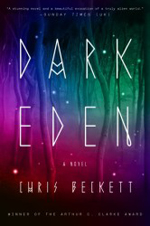 Dark Eden (Dark Eden #1)
Dark Eden (Dark Eden #1)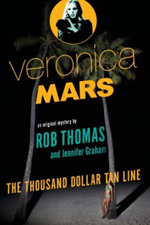 Veronica Mars: The Thousand-Dollar Tan Line (Veronica Mars #1)
Veronica Mars: The Thousand-Dollar Tan Line (Veronica Mars #1) Raising Steam (Discworld #40)
Raising Steam (Discworld #40)